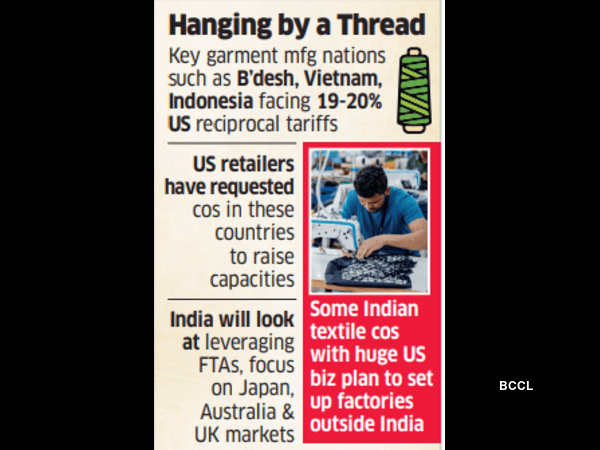
While uncertainty looms over India’s Rs 87,000-crore annual textile exports to the US, a handful of companies with manufacturing facilities overseas plan to shift production for American customers out of India.
Pearl Global Industries, a listed firm, has said production for the US market will be reassigned to more favourable hubs. “We are seeing positive momentum from US customers for our Vietnam, Indonesia, Bangladesh and Guatemala operations,” Pearl Global said during its quarterly results announcement.

Another large textile exporter plans to move its US orders to Africa. “We have a facility in Africa, where we will try to shift our US orders,” said CEO of one of the top 10 garment and textile exporters, requesting anonymity.
“We are seeing healthy growth in Indonesia and Vietnam, following the early resolution of tariff structures in these markets. Now that the US has declared final reciprocal tariffs on all major garment manufacturing countries at 19-20%, we are seeing positive momentum from US customers for our Vietnam, Indonesia, Bangladesh and Guatemala facilities,” said Pallab Banerjee, managing director, Pearl Global, during the earnings call.
Pearl Global has manufacturing bases in India, Bangladesh, Vietnam, Indonesia and Guatemala. It exports fashion garments — including knits, wovens, denim, outerwear, activewear and athleisure — to global brands such as Chicos, Kohl’s, Old Navy, Poligono, Primark, PVH, Ralph Lauren, Stylem and Target.
“With a 50% tariff imposed on India, Pearl Global is recalibrating its business strategy to adapt to evolving trade dynamics. While production for the US market will be reassigned to more favourable hubs, India will continue to grow by tapping new and advantageous partnerships, such as the UK FTA, and focusing on other existing FTA markets like Japan and Australia until the US tariff issue is resolved,” Banerjee said.
The company said US revenue from its India operations in FY25 stands at 16-18% of group revenue, while bottom line from the US business accounts for 4-5% of overall group profit. “We believe such recalibrations should help retain customer wallet share and maintain profitability,” he said. The company will also proceed with its capital expenditure plan in Bangladesh.







